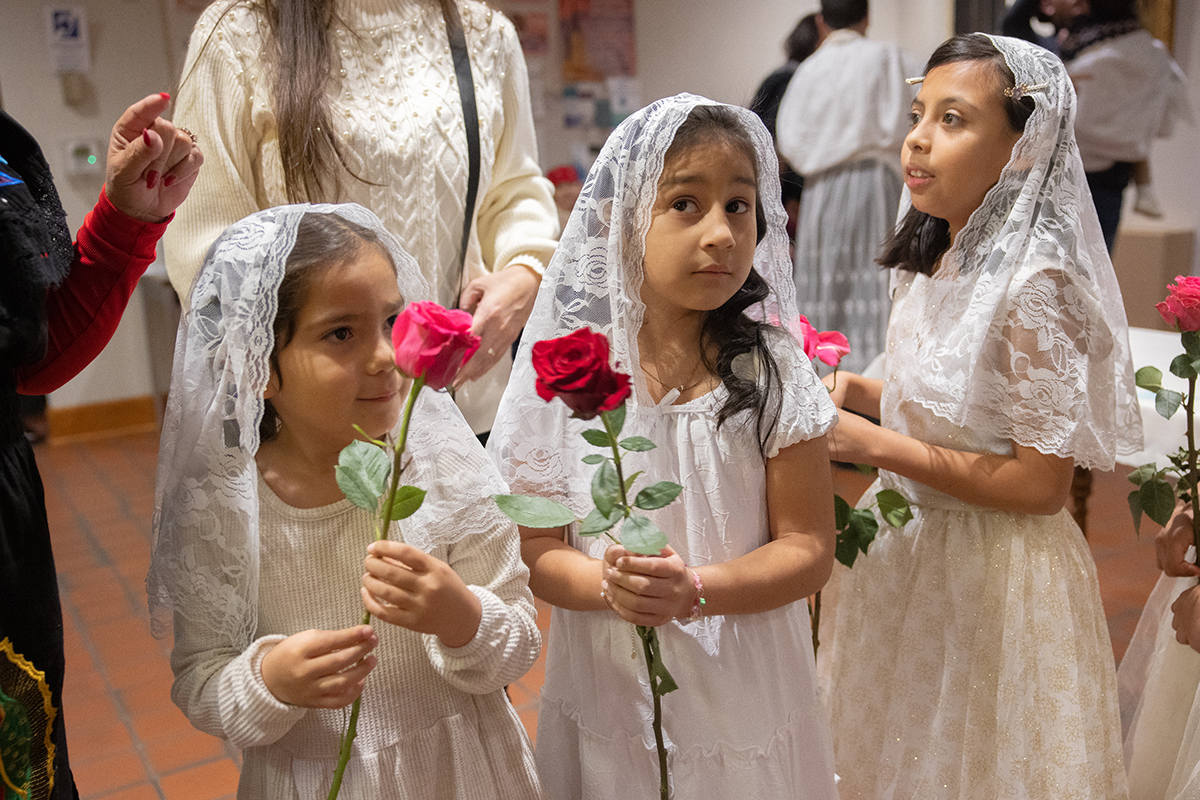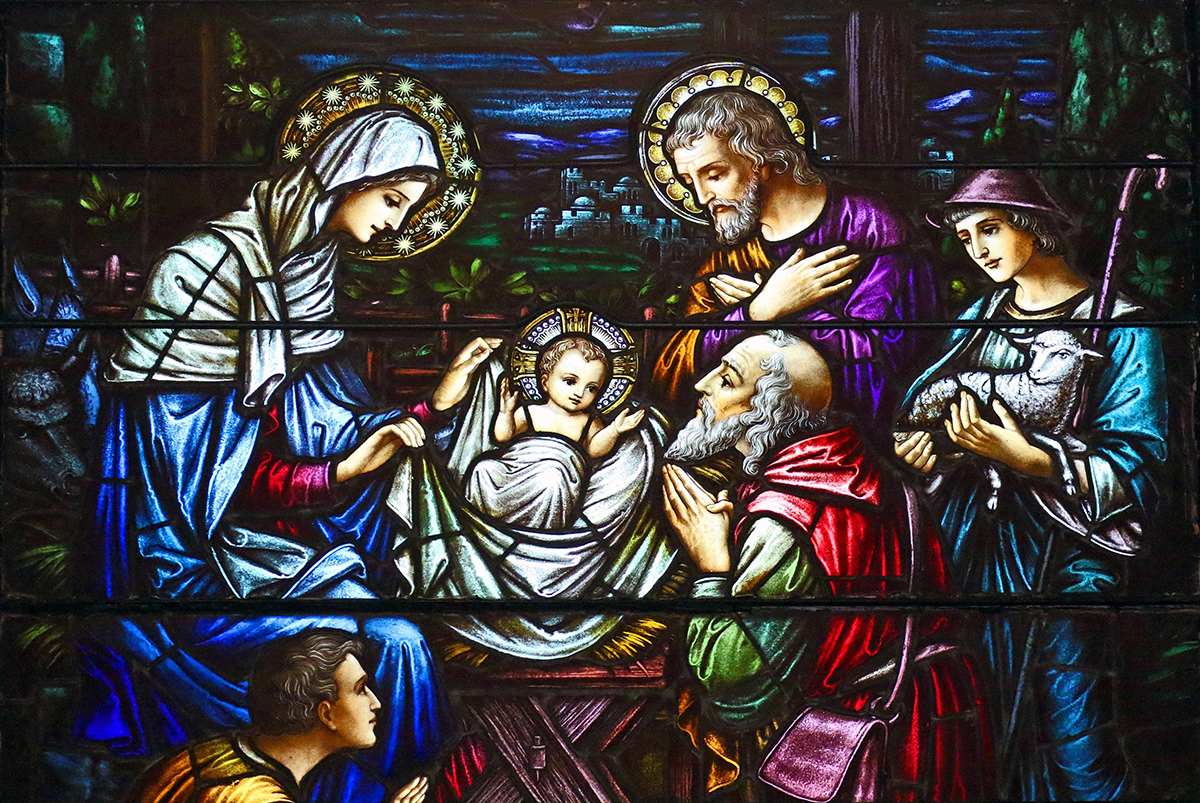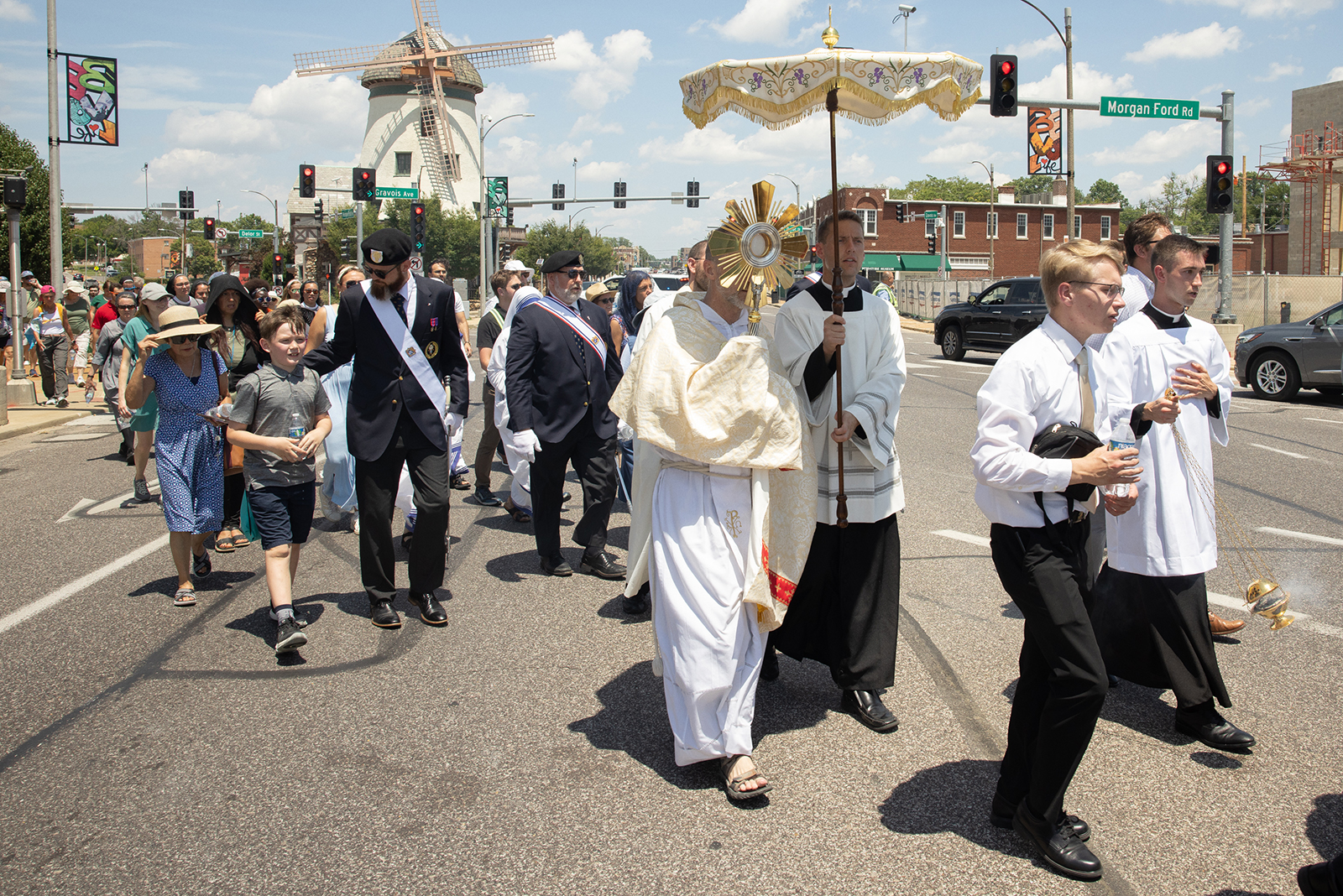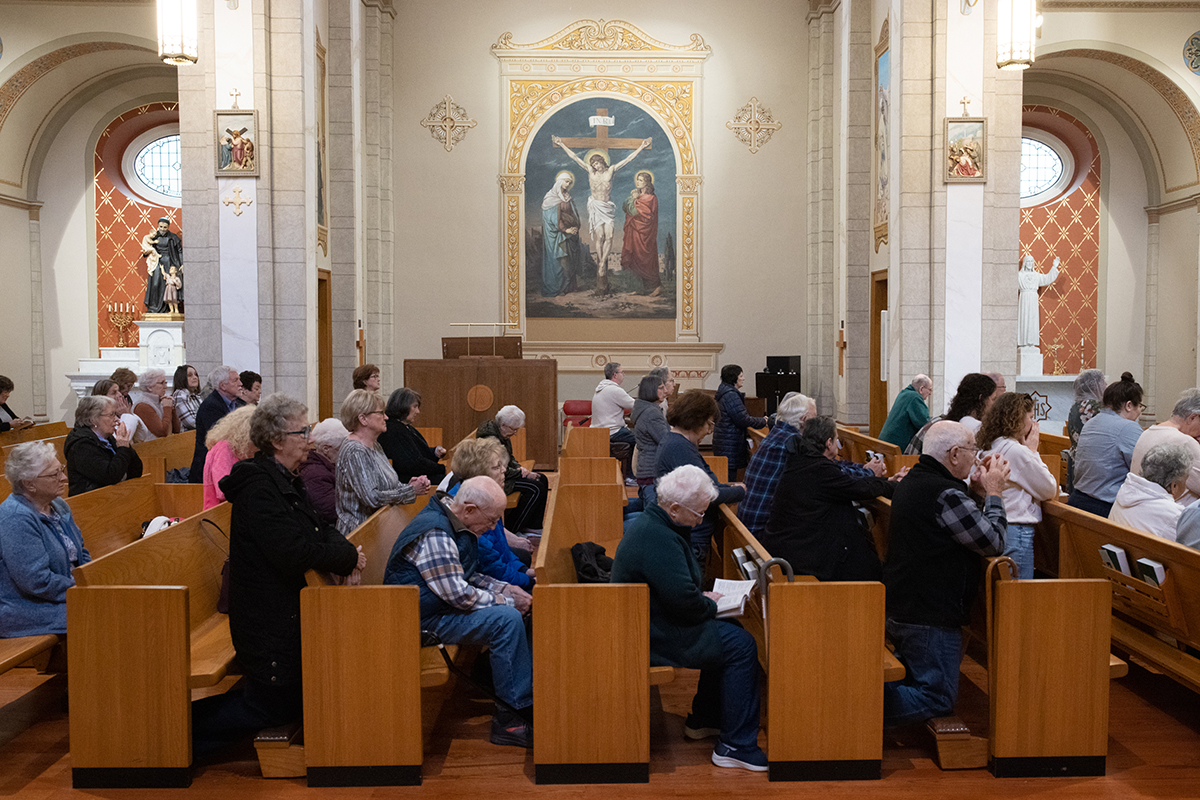CCHD funds helps Baden neighbors stay connected

Our Lady of Holy Cross Senior Center delivers services, love
Jan Quinn leaned on the door of the subcompact car to talk to its occupants while Ollie Shaw handed them a bag with a vegetarian lunch and other items.
“Are things OK?” Quinn asked the man and woman from the neighborhood. They chatted for more than five minutes, including about a nearby sewer project and the woman’s desire for it to include a component to beautify the area. They ended the conversation with Quinn reminding them to call if they have any needs.
Quinn is director of the Our Lady of the Holy Cross Senior Resource Center, which fills a gap in the Baden neighborhood of St. Louis. Though COVID-19 restrictions have curtailed the center’s programming, it still provides Quinn and Shaw a means to tell people they’re loved and respected as God’s children.

Similar centers closed, including a previous one at Our Lady of the Holy Cross Parish, the Father Tolton Center.
Census statistics show the average home sale price in 2019 in Baden was $16,868, and the neighborhood had 33 vacant buildings as of 2018. The median income was $27,064, according to the 2018 American Community Survey.
The center, one of four groups in the archdiocese receiving local grants this year from the Catholic Campaign for Human Development, keeps open lines of communication with people, said Quinn, who is an Our Lady of the Holy Cross parishioner. “People are aging and need services,” Quinn said, adding that needs have changed with increased isolation and fear of the neighborhood.
A transitional population adds to the instability, making it difficult for residents to get to know and work with their neighbors on problems that affect the area, Quinn said. Around 2008 when the recession caused real estate to drop dramatically, foreclosures ensued, and speculators bought properties that became rentals.
“The neighborhood is still more good than bad,” reported Quinn, who lives four blocks from Our Lady of the Holy Cross and calls her block stable. When residents come to the senior resource center, she said, “we get a finger on the pulse of what they need and help them feel a part of the world. The neighborhood has challenges and we have to address them. That’s what we’re doing.”
Before the COVID-19 pandemic, sessions were held on topics such as addressing crime along with a lunch served, attracting as many as 60 people. The center, which is open to anyone, closed for a few months and began providing bagged lunches again a month ago to people who come to the door, now reaching as many as 30 people a day. “We’re feeding anyone who is hungry,” Quinn said.
She still stays in touch with people via phone calls and provides pamphlets to some people when they come to lunch and express a particular need.
The program also reaches out to a homeless population, and it’s seen some successes such as the recovery of a woman who was using drugs to self-medicate for the pain of arthritis. With help of the center and another church, the woman received treatment for her addiction, takes medicine and has a place to live.
Some of the residents of Assisi House, a transitional living program on the parish grounds, volunteer at the center.
Quinn enjoys sitting and talking to the seniors and others who are struggling. Society sees them as “throwaways,” she said, but she’s never thought about anyone that way.
The Catholic Campaign for Human Development helps groups of low-income people in the archdiocese and across the country provide access to affordable housing, health care, jobs, employee-owned businesses and rights for immigrants.
On Thanksgiving last year, the center served meals to 80 people. They’ll do it again this year, only with carry-out meals. Quinn relies mostly on donated food, and the Catholic Campaign for Human Development funds pay for utilities and other fixed costs. “We couldn’t do it without the grant,” Quinn said. “It’s a godsend.”
She’s pleased with the help she receives: “God is looking out for us, so we’re on the right track.”
Parishes will take up a collection for the Catholic Campaign for Human Development at Masses on Nov. 21-22. A fourth of the contribution funds groups within the archdiocese and the rest is used for national grants. Two groups within the archdiocese receive national grants.
Tamara Kenny director of advocacy and community engagement at Catholic Charities of St. Louis, is passionate about the campaign, she said, because “we are empowering people who really deal with what the problems are. The requirement is that the voice of the organization, the board members, are low-income people. They are the ones who understand the problems and obstacles. They are the ones who are best-suited to solve it.”
Unlike other charitable work, which also is important, “You’re not doing for people; you’re helping them do for themselves,” Kenny said.
The groups that are funded are working on important issues, “and it’s fun to be a part of it,” she said. “It’s also very rewarding. These are ordinary, low-income people trying to make their communities better, and we are helping them to that.”
>> Locally funded CCHD Grants
• Our Lady of the Holy Cross Senior Resource Center, $4,000 for gathering seniors and community members for lunch and presentations on how to address obstacles for security, dignity and respect. It helps them take collective action on those issues by writing letters, making phone calls and attending forums to become more educated about policy issues.
• Social Action and Virtue Education (SAVE) Foundation, $6,250 for introducing restorative practices in about 30 schools, first through fourth grades, providing them an opportunity to talk in a group and learn how to solve conflict peacefully.
• St. Ann Catholic School, $6,000 for a food service program that reduces landfill waste, sources sustainably and provides a nutritious meal for free or minimal cost for all who qualify. The school serves people across a spectrum of socio-economic neighborhoods and noticed those from low-income neighborhoods lack access to nutritional food.
• Institute for Peace and Justice (Solving Our Situations), $3,000 for work with women ex-offenders and at-risk youth and teenagers as part of a high school program. The purpose is to help people understand how their thoughts and feelings impact their behavior and to identify ways to be assertive instead of aggressive of passive-aggressive in trying to work with other people. The program helps in identifying real issues that cause problems in their lives and helps them become advocates for themselves. It also looks at broader changes needed in criminal justice.
>> Nationally funded CCHD grants
• Missourians for Alternatives to the Death Penalty, $60,000 to work with the St. Louis County prosecutor’s office in expanding and maintaining opposition to capital punishment; bring attention to historic lynching practices; and work to prevent people with severe mental illness from execution.
• Metropolitan Congregations United for St. Louis, $75,000 for work on criminal justice reform, voter engagement and environmental justice. Eleven members of the organization are Catholic parishes.
New applicants always are being sought for community development and economic development grants. Organizations do not have to be a formally recognized nonprofit for the local grant program. It’s open to any group working for positive, institutional change or groups of parishioners with a passion about an issue. For information, contact Tamara Kenny at (314) 367-5500, ext. 5948 or tkenny@ccstl.org.
>> About CCHD
The Catholic Campaign for Human Development (CCHD) is the domestic anti-poverty program of the U.S. Conference of Catholic Bishops, working to break the cycle of poverty by helping people help themselves.
The Archdiocese of St. Louis participates in this program by partnering with and funding community and economic development projects and providing the Catholic community opportunities to stand in solidarity with their sisters and brothers, especially the poor and marginalized.
CCHD is made possible by the support of Catholics in the United States, especially through the annual parish collection, Nov. 21-22. Contributions to the Catholic Campaign for Human Development, payable to CCHD, also may be mailed to Archdiocese of St. Louis, Finance Office, 20 Archbishop May Drive, St. Louis, MO 63119.
Jan Quinn leaned on the door of the subcompact car to talk to its occupants while Ollie Shaw handed them a bag with a vegetarian lunch and other items. “Are … CCHD funds helps Baden neighbors stay connected
Subscribe to Read All St. Louis Review Stories
All readers receive 5 stories to read free per month. After that, readers will need to be logged in.
If you are currently receive the St. Louis Review at your home or office, please send your name and address (and subscriber id if you know it) to subscriptions@stlouisreview.com to get your login information.
If you are not currently a subscriber to the St. Louis Review, please contact subscriptions@stlouisreview.com for information on how to subscribe.





